Can this happen AT LEAST ONCE?!
Can there be a short story collection or a classic novel without some bullshitty introduction that serves absolutely no purpose whatsoever? I am beyond tired of having to muddle through someone navel-gazing and telling unbelievably dull stories before getting to the actual book. This trend has gone on too long.
The ONLY good introduction I've ever read was by Warren Ellis before one of Joe Hill's Locke & Key graphic novels. It was entertaining, had a point, and was mercifully short. Most introductions (or should I say every one besides Ellis's) is dull, pointless, and long.
I can't be the only one who sighs in irritation when I see an introduction that is more than a page long. And don't get me started on the ones that have more than one introduction. I will explode.
5/7/5
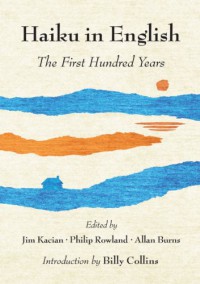
There are so many versions of the poetic form of haiku that it's impossible for anyone not to find something they love, or something that at least speaks to them. I was happy to see I found fresh voices among those I already know of in this book.
A selection of works from this book that I'd call my favorites:
WINTER ECHO
Thin air! My mind is gone.- Yvor Winters
Suicide's Note
The calm,
Cool face of the river
Asked me for a kiss.
- Langston Hughes
Somewhere behind me,
seeming in dark-silence
to feel a slow coiling.
- Foster Jewell
The earth shakes
just enough
to remind us.
- Steve Sanfield
on a plaque
in the enemy's museum
names of our dead
- John J. Dunphy
Other poets that stand out/new favorites:
- Larry Gates
- Janice Bostok
- Bill Pauly
- William M. Ramsey
- David Steele
- Andre Duhaime
- Eve Luckring
- Shawn McMurtagh
- Peter Newton
- Helen Buckingham
Enjoy.
 4
4
The "Anti-Christ" philosopher

I discovered philosophy in college (which was the only subject I excelled at when I was going through a bad mental period), and quickly fell for Nietzsche. It is my personal belief that he is often misconstrued, although I'll be the first to admit I am not exactly a scholar on the man and was disheartened to see that he wrote unfavorably about women. A quote: "Suppose that Truth is a Woman - what then?"
(I could go off on a tangent about how I don't agree with ANY other person all the time, and those whose work I admire inevitably have something about them [professionally or personally] that I don't like, but don't get me started.)
Back to this book. Robinson clearly knows his stuff, and delves into Nietzsche with enthusiasm and attention to detail. He explains the basics of Nietzsche's philosophy, using examples and references to help the reader understand each concept. This is a book that concentrates on the philosophy of the man, and not his biography. Robinson does take care to note that the usage of Nietzschean philosophy as a means for Nazi propaganda is due to Nietzsche's sister Elizabeth distorting her brother's work to serve her own Anti-Semitic means.
(Small note: Robinson uses a hyphen in "no one". As in "no-one". Nope.)
Ultimately this book is a great look at Nietzschean philosophy and ideals. Highly recommended for anyone interested in philosophy.
 5
5
"Soon my thoughts will lose all clarity..."
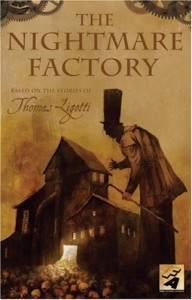
I'm sad to say I hadn't heard much about Thomas Ligotti, although I am a fan of horror. After reading this excellent collection of his short stories turned into a graphic novel format, I'm definitely going to seek out more of his work.
Highly recommended for those who love horror and graphic novels, as well as fans of Lovecraft and Poe.
 5
5
I am once again late to the party.

Apparently Marcel the Shell is a Thing, and I had no idea when I saw this book in my library. I picked it up because it looked odd and fun, and indeed it was.
This is the kind of book that will appeal to kids, hipsters (yeah), and people like me who enjoy weird, sometimes uncomfortable humor. Fans of non sequitirs.
Marcel shows off his digs in someone's bedroom, and his own bedroom is a "breadroom", basically two pieces of bread in a pot that he snuggles into when he wants to sleep. I guess Marcel's owner changes the bread so it doesn't get all moldy, but such details are not explored in this book.
The weirdness factor won me over, hence my high number of stars. Example:

Plus there's the fun sense of wonder:
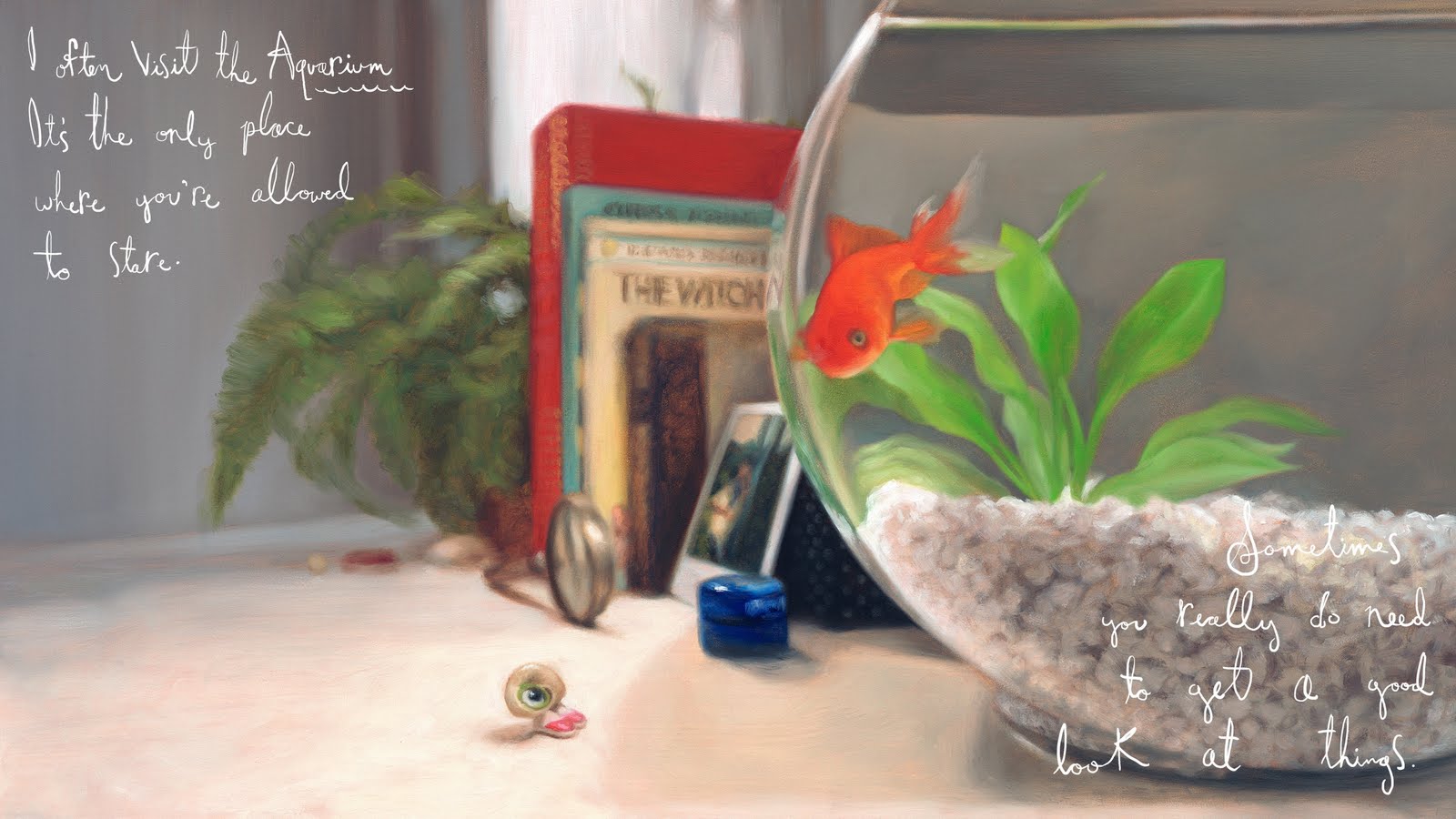
But mostly it's fun weirdness:
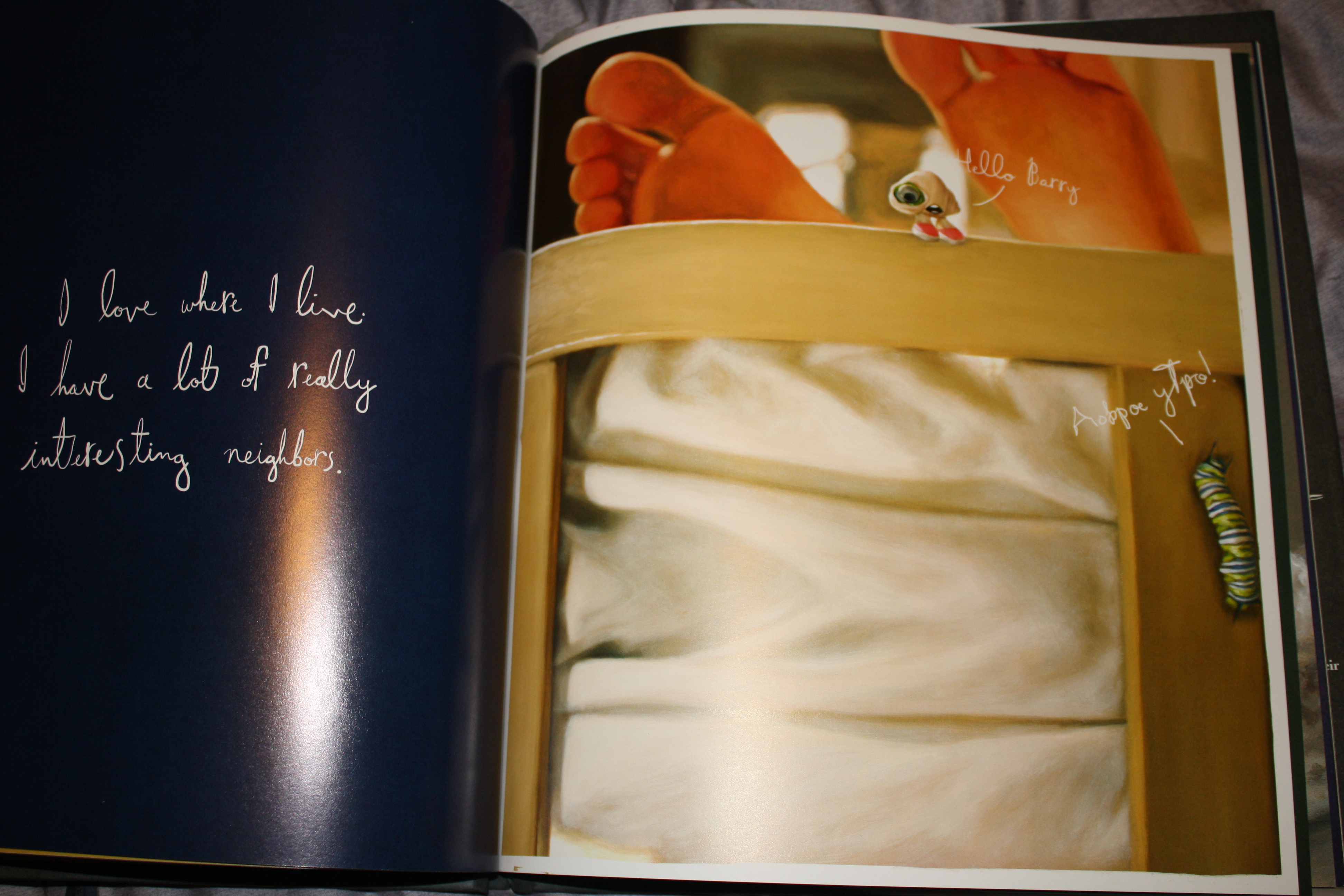
 3
3
New voices heard

With most of these stories only being a page and a half long, I can't much see the point of reviewing all or most of them (plus there's 80 of them and dude, I don't have that much time and wrestling's on tonight!).
Therefore here's a list of authors I discovered and want to read more of thanks to this book, which is often the reason I'll scour short story collections:
- Don Shea
- Alison Townsend
- Stace Budzko
- Katherine Weber
- Steve Almond
- Hannah Bottomy
- Kim Church
- Richard Bausch
- John Biguenet
- Stacey Richter
- Jack Handey
- Samantha Schoech
- Leigh Allison Wilson
- Utahna Faith
- David Galef
- Jenny Hall
- Barry Gifford
- Leonardo Alishan
- Jennifer A. Howard
- Barbara Jacksha
- Ander Monson
- Patricia Marx
- Tony Earley
- Kit Coyne Irwin
- Tom Hazuka
- Sherrie Flick
- Christopher Merrill
- G.A. Ingersoll - ("Test" is a true gem, this book is worth reading just for that story)
- Opal Palmer Adisa
- Bruce Holland Rogers
- Michael Knight - "The Mesmerist" is another gem...would love to see this in novel length, and/or as a movie
 2
2
I loved this.

I think this is the only time I've read a book of poetry in which I enjoyed EVERY poem. Some more than others, of course, but they're all powerful (and short!).
The subject is love, and all that comes with it - joy, heartbreak, regret, nostalgia, etc. There's a poem for everybody, and every emotion.
My two favorites, which reminded me of the relationship I have with my husband:
"He and I"
When words run dry,
he does not try,
nor do I.
We are on par.
He just is,
I just am,
and we just are.
"Always"
You were you,
and I was I;
we were two
before our time.
I was yours
before I knew,
and you have always
been mine too.
Do yourself a favor and get this book, or buy it for someone you know.
Bonus section: Lang Leav offers a service on her website to send "Posted Poems", which allows you to send one her poems to anyone in the world on art paper. A sample:

Here's the website:
http://langleav.com/postedpoems
 6
6
Sometimes things just don't connect.

When describing this book of poems to my husband, I said, "The author's great, he has talent, but I find myself not caring most of the time." I would struggle with certain poems while others jumped out, powerful and haunting.
The thrashing
And the dead, dumped
From nets to baskets,
Like stolen goods under the old
Warehouse's one bulb gleam. Frantic,
Nearing, the search for them continues;
Hear the wind at the door and the sea, leaving
No stone unturned, crashing.
"Reykjavik Winter Couplets"
The beginning stanzas of "Your Natural History" are downright awe-inspiring:

Beautiful. If only more of the book was like this.
 2
2
That day.

"We just kept going down. Dark, light, dark again. I feel like I'm still on the stairs. I wanted my mother. If I live to be a hundred I'll still be on the stairs."
Don DeLillo isn't for everyone. His often unusual dialogue, sometimes hazy shifts in point of view and time can set a casual reader on edge. Those who don't mind or even enjoy his approach are rewarded with poetic prose that manages to be direct, with an ambiguous tone that often leads to a dreamy effect.
One of the characters, Lianne, runs a therapy group for Alzheimer's patients, encouraging them to keep journals of their memories. They write about September 11th, their voices intersecting:
"I am closer to God than ever, am closer, will be closer, shall be closer.
Ashes and bones. That's what's left of God's plan.
But when the towers fell, Omar wrote.
I keep hearing they were holding hands when they jumped."
DeLillo doesn't just focus on the effects of September 11th told through the voices of the survivors and their families. He also gives us a look into the lives of those who carried out the plan:
"The world changes first in the mind of the man who wants to change it. The time is coming, our truth, our shame, and each man becomes the other, and the other still another, and then there is no separation.
There was the feeling of lost history. They were too long in isolation. This is what they talked about, being crowded out by other cultures, other futures, the all-enfolding will of capital markets and foreign policies."
DeLillo shows us moments of doubt in the terrorist's mind (he's named Hammad, and seems to be a fictional character). He wonders "does a man have to kill himself in order to accomplish something in the world...does a man have to kill himself in order to count for something, be someone, find the way?"
He asks a fellow would-be hijacker, Amir, about those who will die, and Amir's reply is chilling:
"The others exist only to the degree that they fill the role we have designed for them...[t]hose who will die have no claim to their lives outside the useful fact of their dying."
It's a haunting novel, but is also often confusing, shifting timelines and viewpoints without notice. This might be intentional to invoke the confusion of September 11th, I'm not sure. It's not an easy read, but those looking to read fiction based on that tragic day should give this one a look.
 7
7
Choose Yourself (Survival Lessons)

Survival Lessons was written after Hoffman was diagnosed with cancer and she longed for a guidebook to help her through her trauma. It is filled with affirmations, none of which are too mawkish and maudlin to connect with the reader. Hoffman is direct, citing personal examples, and is also encouraging in her message of hope.
This book is about choices, giving empowerment to the reader. This piece of advice really connected with me, as I'm still reeling from a family incident that left most of us in tatters:
"Only answer the phone when you want to, and then, give yourself permission to say you can't talk, especially if it's a relative. Make up an excuse. There's someone at my door, a bear is in the living room, there's a meteor shower spilling over my front lawn. Or just tell the truth. I'm tired. I'm sick. I'm at a loss. I'm not ready to talk. Call me later, tomorrow, next month. Better still, let me call you back."
This next piece floored me. I don't want to get too personal, but let's just say that I was told for a long time - most of my life, really - that my instincts were wrong. I have no desire to have children, I never wanted to get married (although I'm glad I did, only because I adore my husband), but I always dreamt of having a great career. Hoffman describes how this yearning is nothing to be ashamed of:
"People say no man on his deathbed ever said he wished he spent more time at the office. I disagree. I assume Pablo Picasso would have said exactly that. Jane Austen would have agreed. When your work brings you joy, you cannot get enough of it. People who turn to work during times of trauma aren't necessarily workaholics; they're in love with what they do."
Ultimately, what Hoffman is telling her readers is to let go of things that are holding them back. Be honest and strive for joy. Seek out pleasure. Live a little:
"Go get a tattoo if you've always wanted one...Stay in your pajamas for days...Buy a pair of kick-ass boots...Volunteer at the museum and be alone with the Egyptian artifacts early in the morning before anyone else has arrived."
Live your life. Love your life. Choose your life.
Odi et Amo
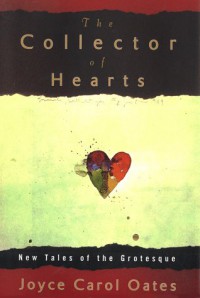
Joyce Carol Oates has the ability to instill creeping dread, not unlike Shirley Jackson and Flannery O'Connor. These stories dwell on the horror of the unknown, drawing out tension while playing upon the terror of the characters.
The William Blake quote in the beginning of the book sums it up best:
"Some are Born to sweet delight
Some are Born to sweet delight
Some are Born to Endless Night"
A few of these stories were too grotesque even for me, but most stand out.
Here are the ones that most resonated with me"
- Death Mother
- The Hand Puppet
- ▄
- The Collector of Hearts
- Posthumous
The collection ends with "The Journey", which begins with explicit imagery:
"How slowly the journey begins. Traversing the lush green landscape by inches. Weeks are required to cover mere miles. Each blade of grass, each sticky moist bud, blossom, tendril, exposed root distinct. You learn not to suck them into your mouth though your instinct is to do so. You smell them, you touch them with wondering fingers. So dense is the snarled foliage overhead you rarely see the sun and have no word for sun but you feel its humid heat that seems not only to descend upon you but to rise up out of the rich dark fecund earth. Soft as flesh. The earth is flesh."
It reminds me of the end of Yeats's "The Second Coming":
"And what rough beast, its hour come round at last,
Slouches towards Bethlehem to be born?"
Both touch upon the horror of the unknown, of inevitable ruin and desecration. Those who delight in dark fiction should give this collection a read.
"Red bird came all winter..."
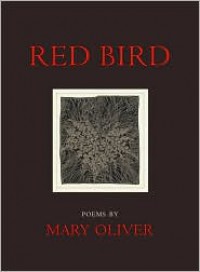
Mary Oliver is a gifted poet. Her use of imagery and self-reflection is powerful, even for those who aren't religious or inclined to love nature.
Death itself
is a music...
I would not
give my life for a thousand of yours.
"Straight Talk from Fox"
I have dreamed
of accomplishment. I have fed
ambition.
I have traded
nights of sleep
for a length of work.
"The Orchard"
Oliver's wonder at the world around her is not confined to rose-colored optimism or faith; she shares her dark feelings willingly, and effectively:
It is hard sometimes, oh Lord,
to be faithful.
"Small Bodies"
Sometimes
melancholy leaves me breathless.
"Sometimes"
The most powerful example of this is her poem "Of the Empire":
We will be known as a culture that feared death
and adored power, that tried to vanquish insecurity
for the few and cared little for the penury of the
many. We will be known as a culture that taught
and rewarded the amassing of things, that spoke
little if at all about the quality of life for
people (other people), for dogs, for rivers. All
the world, in our eyes, they will say, was a
commodity. And they will say that this structure
was held together politically, which it was, and
they will say also that our politics was no more
than an apparatus to accommodate the feelings of
the heart, and that the heart, in those days,
was small, and hard, and full of meanness.
Still, the affirmations of her work are the ones that stand out strong. Oliver sees the beauty in the world, and wants to share it. This is the basis of her poetry, and it resonates with anyone who wants to feel the same sense of awe about this world.
Instructions for living a life:
Pay attention.
Be astonished.
Tell about it.
"Sometimes"
 4
4
Page 71 - My jaw just dropped.

He describes those who attended his book signing and didn't buy his book as "tight-assed" and being "fat asses" after he gave a presentation he thought was "outstanding".

Page 52 - So, no reviews, then.

This book is flat out strange. The author basically says he doesn't seek out reviews because a.) he's an independent writer and will not get "fair treatment", and b.) his books will probably not get raving reviews.

Instead, he vies for reviews in local newspapers, admitting that almost no one will see them. He also realizes that by not seeking out reviews, he is missing out on exposure and profits.
Okay. Here's the new plan.
I'd originally set a goal to read 365 books in a year. However, long story short, I spent about 3 or 4 months writing and forgot about this goal, then a family tragedy set me back. Plus traveling and other stuffs, so my new goal is 300. Right now I'm at 277 books read, so I think this is doable.
I plan to be extremely productive next year so will most likely set my goal at 100, then might try the 365 books again the year after.
I'm still pleased with my reading stats even if I'm stepping back from the original goal. So there you go. :D
 14
14
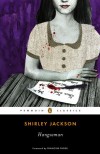




 15
15
